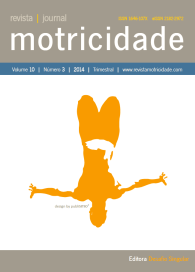Os efeitos da realidade virtual na reabilitação do acidente vascular encefálico: Uma revisão sistemática
DOI:
https://doi.org/10.6063/motricidade.3341Resumo
Este estudo propôs-se a realizar uma revisão sistemática da literatura a fim de verificar os efeitos da realidade virtual (RV) sobre a reabilitação de pacientes que sofreram acidente vascular encefálico (AVE). Foi realizada uma busca nas bases de dados eletrónicas Medline, Lilacs, Scielo e Pubmed, no período de 2004 a 2012. As palavras-chave utilizadas foram: realidade virtual, vídeo game, AVC, fisioterapia, reabilitação, virtual reality, stroke, rehabilitation e physiotherapy. Foram localizados 893 artigos e, ao final da seleção foram analisados nove estudos. Os resultados obtidos mostraram que o treino com RV pode contribuir para a reabilitação de pacientes que sofreram AVE. Os estudos selecionados utilizaram sete sistemas de RV para o treino das seguintes funções: marcha, equilíbrio, membro superior, cognição e perceção. Além disso, dependendo da função treinada, os autores utilizaram diferentes métodos de avaliação. Entretanto, mesmo os estudos que avaliaram funções similares utilizaram instrumentos de avaliação diferentes o que dificulta a comparação dos resultados. Conclui-se que a RV pode promover efeitos positivos na reabilitação de pacientes pós-AVE. Apesar dos resultados promissores, ainda são necessários novos estudos com maior número de sujeitos e melhor qualidade metodológica.
Downloads
Publicado
Edição
Secção
Licença
Os autores dos manuscritos submetidos para publicação deverão ceder, a título integral e permanente, os direitos de autor (copyright) à revista Motricidade e às Edições Sílabas Didáticas. A cedência de direitos de autor permite a publicação e divulgação do artigo em formato impresso ou eletrónico e entrará em vigor a partir da data de aceitação do manuscrito. Os autores concedem, ainda, os direitos para a revista Motricidade utilizar e explorar o respetivo artigo, nomeadamente para licenciar, ceder ou vender o seu conteúdo a bases de resumos/indexação ou outras entidades.
Nos termos da licença “Creative Commons”, os autores poderão reproduzir um número razoável de exemplares para uso pessoal ou profissional, mas sem fins comerciais. Nos termos da licença SHERPA/RoMEO, os autores poderão, ainda, disponibilizar/arquivar uma cópia digital final (versão postprint) do artigo no seu website ou no repositório científico da sua instituição.


